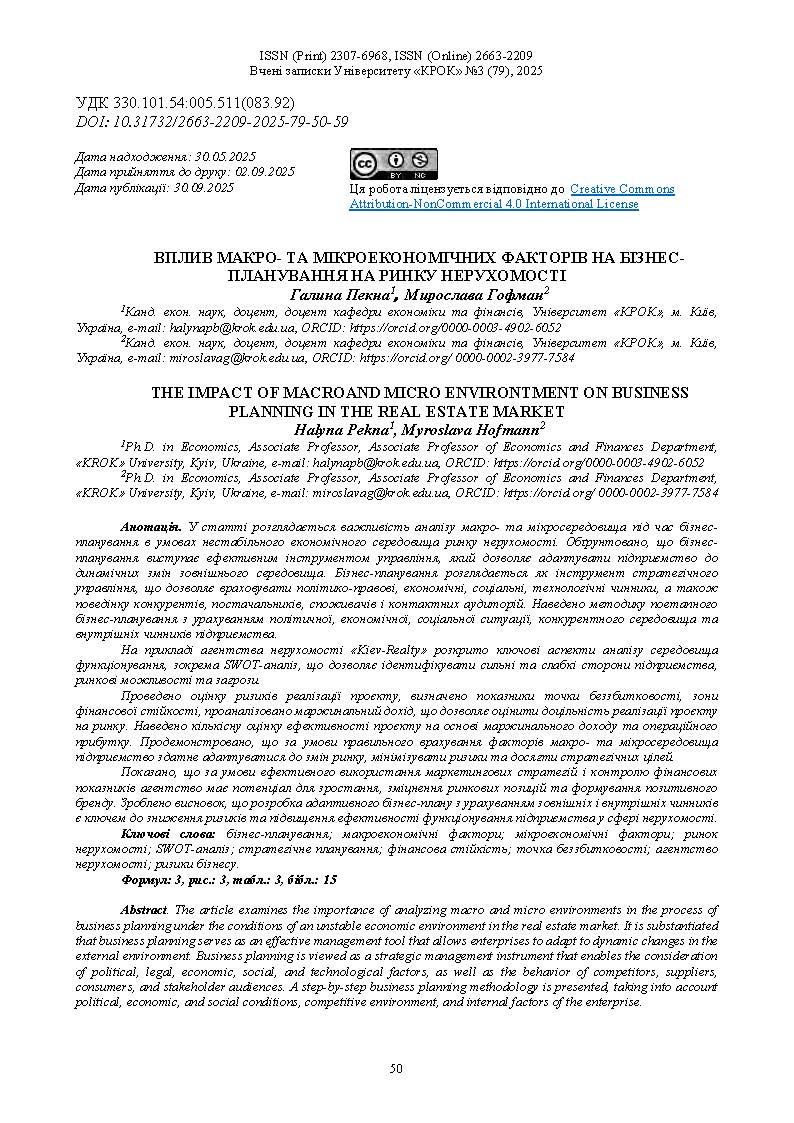ВПЛИВ МАКРО- ТА МІКРОЕКОНОМІЧНИХ ФАКТОРІВ НА БІЗНЕС-ПЛАНУВАННЯ НА РИНКУ НЕРУХОМОСТІ
DOI:
https://doi.org/10.31732/2663-2209-2025-79-50-59Ключові слова:
бізнес-планування;, макроекономічні фактори;, мікроекономічні фактори;, ринок нерухомості;, SWOT-аналіз;, стратегічне планування;, фінансова стійкість;, точка беззбитковості;, агентство нерухомості;, ризики бізнесуАнотація
У статті розглядається важливість аналізу макро- та мікросередовища під час бізнес-планування в умовах нестабільного економічного середовища ринку нерухомості. Обґрунтовано, що бізнес-планування виступає ефективним інструментом управління, який дозволяє адаптувати підприємство до динамічних змін зовнішнього середовища. Бізнес-планування розглядається як інструмент стратегічного управління, що дозволяє враховувати політико-правові, економічні, соціальні, технологічні чинники, а також поведінку конкурентів, постачальників, споживачів і контактних аудиторій. Наведено методику поетапного бізнес-планування з урахуванням політичної, економічної, соціальної ситуації, конкурентного середовища та внутрішніх чинників підприємства.
На прикладі агентства нерухомості «Kiev-Realty» розкрито ключові аспекти аналізу середовища функціонування, зокрема SWOT-аналіз, що дозволяє ідентифікувати сильні та слабкі сторони підприємства, ринкові можливості та загрози.
Проведено оцінку ризиків реалізації проєкту, визначено показники точки беззбитковості, зони фінансової стійкості, проаналізовано маржинальний дохід, що дозволяє оцінити доцільність реалізації проєкту на ринку. Наведено кількісну оцінку ефективності проєкту на основі маржинального доходу та операційного прибутку. Продемонстровано, що за умови правильного врахування факторів макро- та мікросередовища підприємство здатне адаптуватися до змін ринку, мінімізувати ризики та досягти стратегічних цілей.
Показано, що за умови ефективного використання маркетингових стратегій і контролю фінансових показників агентство має потенціал для зростання, зміцнення ринкових позицій та формування позитивного бренду. Зроблено висновок, що розробка адаптивного бізнес-плану з урахуванням зовнішніх і внутрішніх чинників є ключем до зниження ризиків та підвищення ефективності функціонування підприємства у сфері нерухомості.
Завантаження
Посилання
Кваша, О. С., & Фоміна, В. В. (2022). Бізнес-планування у діяльності організації: європейські стандарти, основні методологічні підходи та базові процедури. Економіка і суспільство, 268–275. http://www.economyandsociety.in.ua/journal/12_ukr/45.pdf 30
Габа, М. І. (2014). Значення бізнес-планування на ринку нерухомості. Інтелект ХХІ, 117–121.
Гофман, М., Пекна, Г., Солонець, В. (2024) Параметри ринку нерухомості як середовища підприємницької діяльності. Вчені записки Університету «КРОК», 2(74), 31–41. DOI: 10.31732/2663-2209-2024-74-31-41
Гетало, В. П. (2018). Бізнес-планування: навчальний посібник. Київ: Професіонал. 240 с.
Савчук, В. П., & Олексюк, В. М. (2020). Фінансовий менеджмент. Київ: КНЕУ.
Друрі, К. (2019). Управлінський та виробничий облік. Київ: Центр навчальної літератури.
Гудзь, П. В. (2021). Бізнес-планування як інструмент стратегічного управління підприємством. Економіка і суспільство, 28, 123–130. http://www.irbis-nbuv.gov.ua/cgi-bin/irbis_nbuv/cgiirbis_64.exe?I21DBN=UJRN&P21DBN=UJRN&Z21ID=&S21REF=10&S21CNR=20&S21STN=1&S21FMT=ASP_meta&C21COM=S&2_S21P03=FILA=&2_S21STR=ecchis_2021_28_16
Коваль, Н. В. (2022). Особливості аналізу мікро- та макросередовища підприємства в умовах невизначеності. Бізнес Інформ, 5, 88–94.
Гринько, І. В. (2021). Аналіз ризиків та ефективності інвестиційного проєкту в сфері послуг. Фінанси України, 7, 47–55.
Мельник, О. Г., & Сухомлин, С. О. (2020). Методика SWOT-аналізу у стратегічному плануванні. Маркетинг і менеджмент інновацій, 2, 72–82.
Литвиненко, О. О., & Гайченко, І. В. (2022). Інноваційні моделі управління ресторанним бізнесом в умовах кризи. Бізнес Інформ, 8, 102–109.
Пекна, Г., & Гофман, М. (2025). Мікроекономічні показники діагностики конкурентного середовища на ринку нерухомості. Вчені записки Університету «КРОК», 1(77), 54–65. https://doi.org/10.31732/2663-2209-2025-77-54-65
Бондаренко, Т. В. (2020). Методи оцінки ефективності інвестицій у ресторанний сектор. Економіка та держава, 10, 65–72. http://www.irbis-nbuv.gov.ua/cgi-bin/irbis_nbuv/cgiirbis_64.exe?I21DBN=LINK&P21DBN=UJRN&Z21ID=&S21REF=10&S21CNR=20&S21STN=1&S21FMT=ASP_meta&C21COM=S&2_S21P03=FILA=&2_S21STR=ecde_2019_2_8
Черниш, І. П. (2019). Формування конкурентної стратегії агентства нерухомості. Економічний простір, 145, 98–103.
United Nations Industrial Development Organization (UNIDO). (2016). Business Plan Guidelines for SMEs. Vienna: UNIDO.

Downloads
Опубліковано
Як цитувати
Номер
Розділ
Ліцензія

Ця робота ліцензується відповідно до Creative Commons Attribution-NonCommercial 4.0 International License.

